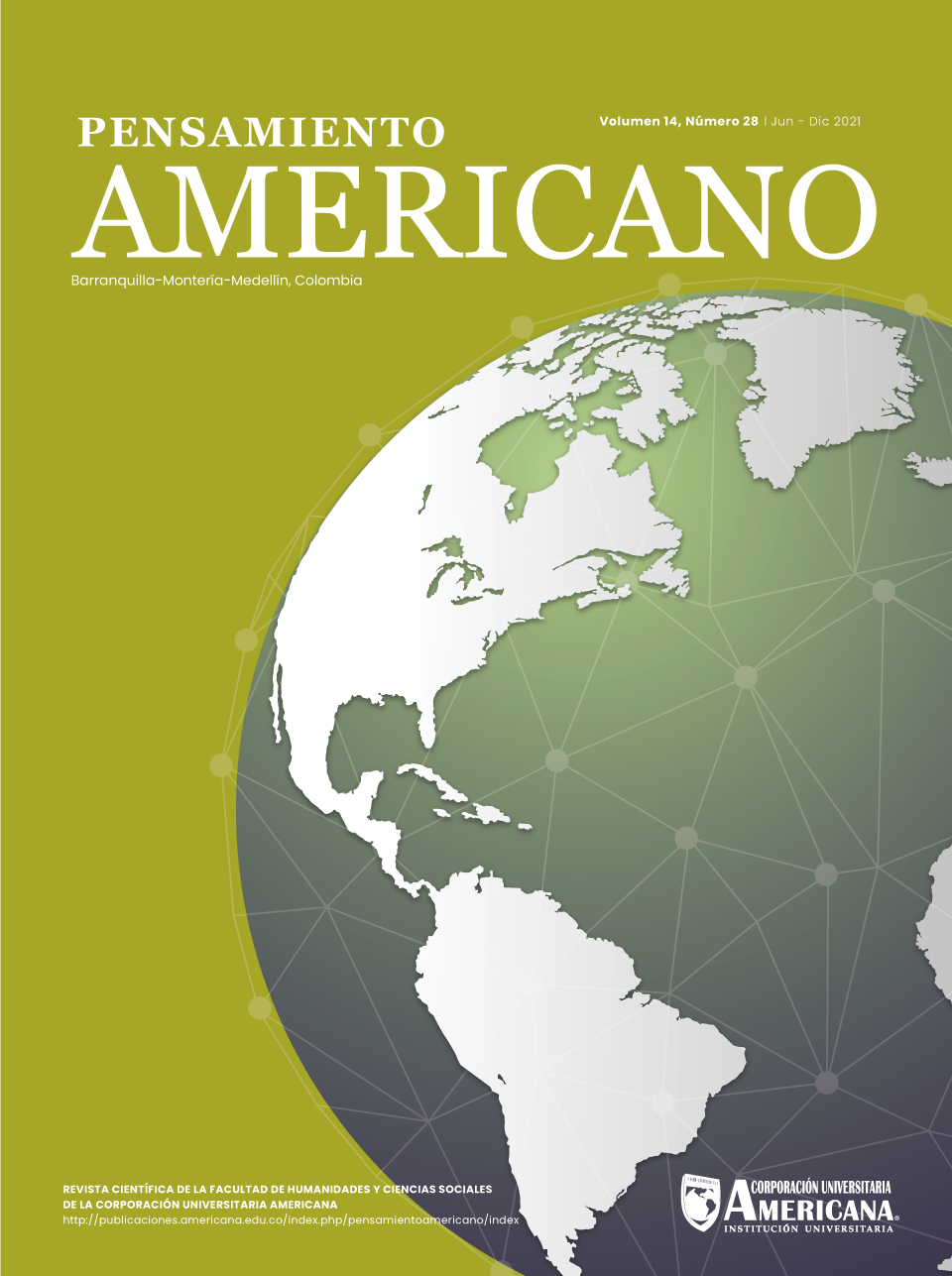Social progress? A historical-critical analysis of measurement in Colombia 2000-2018
DOI:
https://doi.org/10.21803/penamer.14.28.477Keywords:
Socio-economic indicators, Social Progress, Human Rights, Relative Deprivation, InequalityAbstract
This research is presented as a critical analysis of the conventional concept of social progress from different indicators that record Human Development, income inequality, quality and standard of living. In this way, the aim is to explain why, in fact, one can find a positive behavior of the conventional indicators of social progress in Colombia, which contrasts with the evolution of the social conflict in terms of the social and union struggle, and the increase in the number of people arrested. The research proposes the need to establish an approach to the concept of social cohesion in the redefinition of social progress in order to overcome the methodological contradictions exposed.
Downloads
References
Banco Mundial. (2020). Banco de datos: Colombia. https://datos.bancomundial.org/pais/colombia
Castillo, M. y Bou Franch, V. (2008). Curso de derecho internacional de los derechos humanos. Tirant lo Blanch.
Centro de Investigación y Educación Popular (CINEP). (2019). Bases de datos de Luchas Sociales en Colombia, Acciones Colectivas por paz y Actores y Dinámica del conflicto. https://www.cinep.org.co/Home2/servicios/sistema-de-informacion-general-sig/base-de-datos-de-luchas-sociales.html
Cohen, G. (2004). ¿Igualdad de qué? Sobre el bienestar, los bienes y las capacidades. En Sen, A. y Nussbaum, M. (Eds.), La calidad de vida (pp. 27-53). Fondo de Cultura Económica.
de la Garza, E. (2012). La metodología marxista y el configuracionismo latinoamericano. En E. de la Garza y G. Leyva (Eds.), Tratado de metodología de las ciencias sociales: perspectivas actuales (pp. 229-255). Fondo de Cultura Económica.
Departamento Administrativo Nacional de Estadística (DANE). (2017). Boletín técnico. Pobreza Monetaria y Multidimensional en Colombia. 2017. https://www.dane.gov.co/files/investigaciones/condiciones_vida/pobreza/bol_pobreza_17.pdf
Gil, I. (2012). Marxismo vs. Sociología. Trinchera.
GNH Center. (s.f.). Qué es la Felicidad Interior Bruta. https://gnhcenterspain.org/fib-que-es-la-felicidad-interior-bruta/
Grupo de Prisiones. (2019a). Información estadística consolidada. Universidad de los Andes. https://grupodeprisiones.uniandes.edu.co/index.php/2-uncategorised/148-estadisticas-prueba
Grupo de Prisiones. (2019b). Población interna según sexo, capacidad y situación jurídica. Universidad de los Andes. https://grupodeprisiones.uniandes.edu.co/images/PDFs/estadisticas_inpec/poblacion_interna/poblacion.interna.segun.sexo.capacidad.situacion.juridica.anual.dic1990.feb2011.pdf
Gurr, T. (1974). El porqué de las rebeliones. Asociados.
Instituto Nacional Penitenciario y carcelario (INPEC). (2019a). Población domiciliaria. http://200.91.226.18:8080/jasperserver-pro/flow.html?_flowId=dashboardRuntimeFlow&dashboardResource=/public/Domiciliarias/Dashboards/Tablero_Domiciliarias_Colombia&j_username=inpec_user&j_password=inpec
Instituto Nacional Penitenciario y carcelario (INPEC). (2019b). Población intramural. http://200.91.226.18:8080/jasperserver-pro/flow.html?_flowId=dashboardRuntimeFlow&dashboardResource=%2Fpublic%2FDEV%2Fdashboards%2FDash__Poblacion_Intramural
Kosík, K. (1967). Dialéctica de lo concreto. Grijalbo.
Lukács, G. (2014). Marx, ontología del ser social. Akal.
Marx, K. (1985). Grundrisse. Lineamientos fundamentales para la crítica de la economía política 1857-1858. Fondo de Cultura Económica.
Marx, K. (2001). El capital. Tomos I-III. Fondo de Cultura Económica.
Mill, J. S. (2014). El utilitarismo. Alianza Editorial.
Ocampo, J. (2015). La búsqueda, larga e inconclusa, de un nuevo modelo 1981-2014. En Ocampo, J. (Comp.), Historia económica de Colombia (pp. 293-372). Fondo de Cultura Económica.
Organización de las Naciones Unidas (ONU). (1969). Declaración sobre el Progreso y el Desarrollo en lo Social. https://www.ohchr.org/SP/ProfessionalInterest/Pages/ProgressAndDevelopment.aspx
Organización de las Naciones Unidas (ONU). (1995). Cumbre Mundial Sobre Desarrollo Social (Copenhague, 1995). "Implementación y Seguimiento de los Acuerdos de la Cumbre Social – Post Ginebra 2000". https://www.semujeres.cdmx.gob.mx/storage/app/media/DerechosMujeresyNinas/Cumbre_DesarrolloSocialCopenhague.pdf
Organización de las Naciones Unidas (ONU). (2017). Carta de las Naciones Unidas. http://www.un.org/es/sections/un-charter/chapter-i/index.html
Organización de las Naciones Unidas (ONU). (s.f.). Desarrollo. https://www.un.org/es/sections/what-we-do/promote-sustainable-development/
Piketty, T. (2019). Capital e ideología. Ariel.
Programa de Naciones Unidas para el Desarrollo (PNUD). (1994). Informe sobre Desarrollo Humano 1994. http://hdr.undp.org/en/content/human-development-report-1994
Programa de Naciones Unidas para el Desarrollo (PNUD). (2001). Informe sobre Desarrollo Humano 2001. http://hdr.undp.org/sites/default/files/hdr_2001_es.pdf
Programa de Naciones Unidas para el Desarrollo (PNUD). (2015). ¿Qué es el desarrollo humano? http://hdr.undp.org/en/node/2228
Programa de Naciones Unidas para el Desarrollo (PNUD). (2016). Informe sobre Desarrollo Humano 2016. http://hdr.undp.org/en/content/human-development-report-2016
Programa de Naciones Unidas para el Desarrollo (PNUD). (2018). Índices e indicadores de desarrollo humano. http://hdr.undp.org/sites/default/files/2018_human_development_statistical_update_es.pdf
Programa de Naciones Unidas para el Desarrollo (PNUD). (s.f.). UNPD – Human Development Index HDI. http://hdr.undp.org/en/content/human-development-index-hdi
Red Colombiana de Ciudades Cómo Vamos (RCCCV). (2016). Índice Progreso Social para Colombia, mejora. https://redcomovamos.org/indice-progreso-social-para-colombia-mejora/
Sachs, J. (2015). La era del desarrollo sostenible. Paidós.
Sañudo, M. y Sánchez-Cárcamo, R. (2014). Enfoque basado en derechos humanos: guía para su uso en incidencia y políticas públicas. Editorial Pontificia Universidad Javeriana.
Sithey, G., Thow, A-M. y Li, M. (2015). Felicidad nacional bruta y salud: lecciones desde Bhután. https://www.who.int/bulletin/volumes/93/8/15-160754/es/
Social Progress Imperative. (s.f). Índice de Progreso Social. https://www.socialprogress.org/
Stiglitz, J., Sen, A. y Fitoussi, J. P. (2009). Informe de la Comisión sobre la Medición del Desarrollo Económico y del Progreso Social. http://www.ambafrance-es.org/IMG/pdf/Commission_Stiglitz_ES.pdf
Veblen, T. (2000). Teoría de la clase ociosa. Elaleph.com http://www.elaleph.com/libro/Teoria-de-la-clase-ociosa-de-Thorstein-Veblen/1051/
Verstrynge, J. (1997). Anti-sistema, privación relativa y voto de protesta. En Verstrynge, J. (Ed.), Los nuevos bárbaros (pp. 25-50). Grijalbo Mondadori.
Zamora, R. y García, M. (1988). Sociología del tiempo libre y consumo de la población. Editorial Ciencias Sociales.
Downloads
Published
Versions
- 2021-12-30 (3)
- 2024-05-31 (2)
- 2021-12-30 (1)
Issue
Section
License
Copyright (c) 2021 Pensamiento Americano

This work is licensed under a Creative Commons Attribution-NonCommercial-NoDerivatives 4.0 International License.
The author or authors of an article accepted for publication in the Journal Pensamiento Americano will transfer all of the patrimonial rights to the American University Corporation free of charge, within which are included: the right to edit, publish, reproduce and distribute both print media as digital, in addition to include in article in international indexes and / or databases, likewise, the Editorial Seal is authorized to use the images, tables and / or any graphic material presented in the article for the design of covers or posters from the same magazine. By assuming the patrimonial rights of the article, it may not be partially or totally reproduced in any printed or digital media without its express permission.
AUTHORITY ASPECTS
For the Pensamiento Americano Journal, all the authors of an article have made substantial contributions to the research and the manuscript, and they share the responsibility when the article presents errors, fraud in some way or violations of copyright.
After submitting an article, the journal does not accept the addition, deletion or change in the order of the authors, in addition we reserve the right to release the article when it has been submitted to the journal and under no circumstances will American Thought accept the article. withdrawal of an article during any phase of the editorial process






